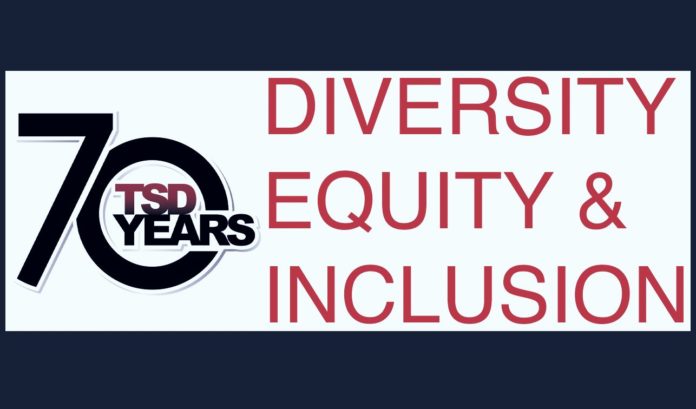As an element in the yearlong observance of The New Tri-State Defender’s “Road to 70 and Beyond!” anniversary – the TSD has embarked on an exploration of Diversity, Equity & Inclusion (DEI), a business strategy embraced worldwide to increase company success.
DEI programs at FedEx, International Paper (IP), AutoZone and other corporations will be examined.
Story content, intended to help large and small businesses fine-tune their programs, will be aimed at DEI methods, achievements and challenges.
Defining ‘DEI’
Each term in the strategy is connected, yet distinctive.
Diversity for Social Impact – a firm promoting DEI globally – defines it clearly.
■ Diversity supports talent from a mix of backgrounds involving race, age, gender, physical ability, ethnicity, beliefs, style, personality, sexual orientation and experiences.
■ Equity ensures fair and impartial processes, providing equal possibilities for all individuals, and upholds justice in the procedures and distribution of resources.
■ Inclusion invites and integrates diverse opinions and backgrounds, resulting in stronger commitments, more innovation and better profits.
Employers hire DEI experts to ensure that needs are assessed and met across the board.
Business consulting giant Deloitte stresses making TRUST a priority and ensuring diversity at every company level – board of directors, executive team, employee base and internal/external partnerships.
Leading the case for diversity
FedEx, IP and AutoZone – Fortune 500 companies headquartered in Memphis – are among U.S. corporations producing the largest revenues annually.
Much of the profits of each stem from innovations – new products, services or policies – developed through DEI programs.
Each of “the big three” is committed to the strategy.
“Embracing diversity is not just the right thing to do … We also have proven that it fosters innovation and makes us a more competitive company,” said FedEx Chairman and CEO Fred Smith.
The heads of FedEx, IP and AutoZone set the right tone by asserting DEI as essential versus optional.
Mark Sutton, IP chairman and CEO, makes this clear.
“Each person’s background, education or personal characteristics may differ. But by bringing all their individual experiences and skills to work – and by listening to and engaging with everyone – we can be successful,” he said.
“This is ‘not optional’ in our people-driven company.”
Continuous improvement is key
DEI is an ever-evolving strategy, not a “one-and-done.”
At FedEx, continuous improvement is routine. The company’s latest DEI enhancements are noted in its 2021 Environmental, Social & Governance report.
“In 2020, we established a DEI Depot, an online platform to create more awareness of DEI-related resources, events and team member stories,” said Smith.
“We’ve also increased educational opportunities – including unconscious bias training – and we maintain employee support communities, including: Women in Leadership, Black Professionals Network, Asia Network, U.S. Military Veterans and many others.”
Change is long overdue
Despite the promise of better performance and profits, DEI is greatly underused, causing persistent inequities for diverse racial groups and genders.
Diversityjobs.com, a leading source for diversity hiring, published disturbing facts in the 2019 piece “The Role of Talent Acquisition in Driving Organizational Diversity.”
“Since the Civil Rights Act passed in 1964 – which criminalized discriminatory hiring (and firing) practices – there have been roughly 14,500 studies determining that a diverse workforce drives organizational success,” said Ehab Hafez, an international human resources and organizational change expert based in the United States.
“One would think – by now – we would be in the ‘advanced stages’ of attracting, growing and retaining diverse talent. Unfortunately, that is still far from reality.”
Data showed only 11 percent of executives at publicly traded companies represent diverse racial or ethnic groups, just a 2 percent rise from 2003.
Plus, women hold only 19 percent of senior executive jobs, underrepresenting females who comprise 51 percent of America’s population.
Wage gaps persist
In 2020, diversityjobs.com posted Pew Research Center data from their latest wage survey conducted in 2015. Results illustrated median race and gender wage gaps among adults age 25-plus with a bachelor’s degree or higher.
Black and Hispanic men earned $25 to $26 hourly while white and Asian men earned $32 to $35 respectively.
Hispanic and Black women earned $22 to $23 hourly while white and Asian women earned $25 to $27 respectively.
Without a bachelor’s degree, median hourly wages showed Black and Hispanic men earned $15 and $14 while white and Asian men earned $21 and $24 respectively.
Asian and white women earned $18 and $17 while Black and Hispanic women $13 and $12 respectively.
Asian men and women out-earned all groups. Historically, white males have dominated earnings.
Success comes from the top
Corporations, universities, hospitals, non-profits and public agencies are championing DEI like never before.
However, DEI can fail if there’s no true buy-in from the top or done “just for show.”
In 2019, Harvard Law Forum on Corporate Governance gave DEI guidance to board chairs and CEOs, stressing that organizational change starts with the chair.
By diversifying the board as a model – and having the chair and CEO set a tone of importance – buy-in grows from executives to front-line employees.
Chaitra Vedullapalli, Forbes Councils Member, summed-up the DEI endgame in Forbes’ October piece: “What’s Your Diversity, Equity & Inclusion Strategy Missing?” which said:
“It’s no longer a secret that enabling diverse teams is a good business decision, which contributes to building an inclusive economy.
“So, there’s really no downside to creating a diverse and inclusive workplace while being equitable.
“Yet – somehow – corporate America has consistently fallen short in this regard, as organizations ignore one simple fact – DEI is about people.”


